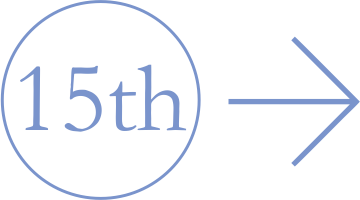14th Century Russia
Throughout the 14th century there was a power struggle for dominance over Rus lands between the Rus principalities themselves (primarily Moscow and Tver, but also later joined by Suzdal-Nizhny Novgorod) and from outside (Sweden, the Livonian Order, Lithuania and of course the Golden Horde). The power of each rose and fell, but Moscow quickly showed potential as the regional leader. However, despite Dmitry Donskoy's victory over the Golden Horde in 1380, Moscow still ended the century having to balance the power of the Lithuanians in the north and the Tatars in the south.
Struggle between Moscow and Tver: Yury and Mikhail

When Grand Prince Andrey III of Vladimir (Andrey Gorodetsky) died in 1304, the two up-and-coming Rus principalities of Moscow and Tver vied to be named grand prince of Vladimir by the khan. Yury Danilovich succeed his father Daniil in Moscow in 1303, while Tver was ruled by Mikhail Yaroslavich (son of Grand Prince Yaroslav III). Both princes went to the Golden Horde to plead their cases to the khan as to whom should be appointed grand prince of Vladimir. Khan Tokhta supported Mikhail who presumably promised the khan more tribute. In 1308 Mikhail led a campaign against Moscow to punish his competition but could not breach the kremlin. The two princes also sought influence over Novgorod, understanding full well that its riches were essential in winning the khan's favour. Mikhail of Tver originally managed to have himself elected prince of Novgorod by blockading the Novgorodian city of Torzhok, but Yury of Moscow outmanoeuvred Mikhail in the Golden Horde paying homage to the new khan - Uzbek, who assumed the throne in 1313 and later adopted Islam as the state religion of the Golden Horde. In Mikhail's absence Yury was able to have his brother Afanasy Danilov elected prince of Novgorod in 1314. Mikhail eventually regained Novgorod in 1315 by force.
In 1317 Yury sought to further improve relations with the Golden Horde and married Khan Uzbeg's sister Konchaka. He then turned Khan Uzbek against Mikhail of Tver and led an army along with the Tatar commander Kavgadi against Tver. Mikhail met the army at the Battle of Bortenevo in December 1317 and was victorious. However Konchaka was taken prisoner and later died in captivity in Tver. Following the death, which had never been conclusively explained, both Mikhail and Yury rushed to the Golden Horde. Yury arrived first and was able to blame Mikhail for the death of the khan's sister. Mikhail was tried and imprisoned in stocks. In 1318 after a month of imprisonment and torture Yury and Kavgadi decided to be rid of Mikhail once and for all and had their men kill him. After Mikhail's death Yury was named grand prince of Vladimir, although he remained in his capital of Moscow. He also reinstalled his brother Afanasy in Novgorod.
As grand prince it was Yuri's responsibility to collect the tribute and pay it to the khan in the Golden Horde. In 1322 Dmitry the Terrible Eyes, the son of the murdered Mikhail of Tver and the new ruler of the Tver Principality, recognised Yuri of Moscow's suzerainty and handed over the Tver tribute for the Golden Horde. However instead of sending it onto the khan immediately he took it to Novgorod and hoped to make a profit on it before taking it to the Horde. Upon learning of this Dmitry informed the khan and in 1322 Khan Uzbek made Dmitry the Terrible Eyes grand prince instead. Yury fled to his brother Afanasi of Novgorod and was made prince of Novgorod himself. While in Novgorod he established the fortress of Oreshek on the mouth of the Neva in 1323 and signed a peace treaty with Sweden. Eventually in 1325 Yury went to the Golden Horde to plead his case to Khan Uzbek. There he met Dmitry the Terrible who, upon seeing Yury, murdered him in revenge for the death of his father. As a result the khan executed Dmitry.
Struggle between Tver and Moscow: Aleksandr Mikhailovich and Ivan Kalita
With the death of both the Grand Prince Dmitry the Terrible Eyes of Tver and Grand Prince Yury Danilovich of Moscow in 1325, Dmitry's brother Aleksandr Mikhailovich was made grand prince of Vladimir, Novgorod and Tver. In Moscow, Yury was succeeded by his brother Ivan Danilovich, later known as Ivan Kalita - Ivan the Moneybags – due to his wealth. Kalita used the wealth of Moscow to bring other principalities under Moscow’s control by granting loans. Such principalities to fall under Kalita’s influence include the Belozersk, Dmitrov, Galich, Kostroma and Uglich principalities.
Grand Prince Aleksandr Mikhailovich of Tver may have got the upper hand over Kalita at first by being named grand prince of Vladimir but his reign faced a crisis in 1327, which Kalita made good use of. In the summer of 1327 Schelkan (sometimes spelled Cholkhan) a cousin of Khan Uzbek, arrived in Tver as the khan’s representative. Schelkan began tormenting the local population who eventually rose up against him. Schelkan and his men sought shelter in his residence, but instead were burnt alive there when the Tver citizens set it alight. It is not known whether this act was supported by Aleksandr, but he certainly understood the danger he was now in and fled from Tver fearing the Tatar reprisal. Ivan Kalita was already on his way to inform the khan. Khan Uzbek ordered Ivan Kalita and Aleksandr Vasilievich of Suzdal to send a punitive campaign against Tver, which devastated the city. Aleksandr’s brother Konstantin became prince of Tver. He was married to the daughter of Yuri of Moscow and recognised the superiority of Moscow. Kalita had, for now, triumphed over Moscow's greatest Rus rival. Aleksandr first fled to Novgorod, which refused to harbour him fearing Tatar retribution. He went on to Pskov which not only welcomed him, but made him prince. Aleksandr though did not wish to repay the city’s hospitality with destruction and left of his own accord to spare the city the same fate as Tver. He was eventually received in the Grand Duchy of Lithuania by Grand Duke Gediminas.
Relocation of the Seat of the Metropolitan
In 1305 Metropolitan Maximus (Maksim) of Kiev and All Rus died. Back in 1299 Maximus moved his official seat from Kiev to Vladimir, demonstrating the shift of the centre of Rus from the south-west to the north-east. The title though remained Metropolitan of Kiev and All Rus and the metropolitan was supposed to be responsible for all Orthodox Christians in Rus, including those in Galicia, which became a kingdom in 1253, and the Grand Duchy of Lithuania which had gained control of the former Polotsk Principality after the Mongol Invasion. The new metropolitan was nominated by the king of Galicia and his nominee of Peter (Pyotr) was appointed metropolitan in 1308 by the patriarch in Constantinople.
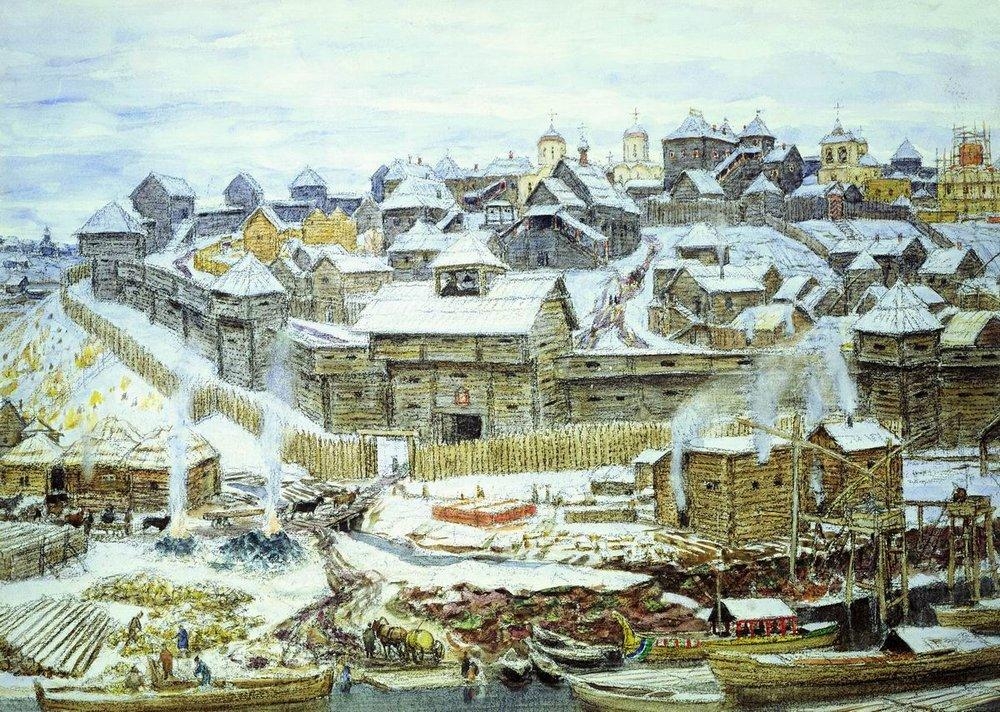
The princes of Moscow understood the influence the metropolitan had over Rus affairs. Whereas the previous metropolitan was a supporter of Tver, the favour of Metropolitan Peter was quickly won by Moscow. So much so that in 1325 Peter accepted the offer of Ivan Kalita to move his official residence to Moscow, thereby making Moscow the spiritual capital of Rus. Moscow had pulled off quite a coup. To make Moscow suitable for such a role, Kalita commissioned the construction of the Dormition Cathedral, the Archangel Michael Cathedral and the Saviour Cathedral in the Moscow Kremlin to rival those of Vladimir. He also later had the walls of the kremlin rebuilt in oak.
Foundation of the Suzdal-Nizhny Novgorod Grand Principality
After the fall from grace of Aleksandr of Tver, Uzbek Khan named Prince Aleksandr Vasilievich of Suzdal (the grandson of Grand Prince Andrey II) grand prince of Vladimir in 1328. Ivan Kalita of Moscow was named Aleksandr's co-ruler. Aleksandr though died in 1331 leaving Kalita as the sole grand prince of Vladimir. Kalita died in 1341 but was successful in having his son Semyon named as his successor as grand prince of Vladimir. At the same time the territories of Nizhny Novgorod and Gorodets were transferred to the Suzdal Principality, which was now ruled by Konstantin Vasilievich. In 1350 Konstantin moved the capital from Suzdal to Nizhni Novgorod, thereby founding the Suzdal-Nizhny Novgorod Grand Principality. Upon his death in 1355 he divided the principality between his sons.
Black Death
In the 1330s a plague spread across Central Asia along the Silk Road and by the 1340 soldiers of the Golden Horde had become infected with what has now become known as the Black Death. In 1347 it is believed that Khan Dzhanibek of the Golden Horde used a primitive form of chemical warfare during the siege of the city of Kaffa (now known as Feodosia) in the Crimea. Infected corpses were catapulted into the fortified city. Fleeing Genoese traders then took the plague to Sicily from where it struck Western Europe. The Black Death then made its way across Northern and Eastern Europe, reaching Pskov and Novgorod in 1352. In 1353 Moscow succumbed to the plague which proved its famous disregard for rank: Grand Prince Semyon, two of his sons, his brother Andrey of Serpukhov and Metropolitan Theognostus all lost their lives. Semyon was succeeded by his brother Ivan Ivanovich (Ivan II). Other Rus principalities were also devastated by the plague.
Rise of Lithuania
During the reign of Grand Duke Gediminas of Lithuania (reigned 1316-1341), the territory of Lithuania was vastly expanded at the expense of former territories of Kievan Rus. Lithuania had already gain control of the former Polotsk Principality (modern day Belarus) after the Mongol Conquest and Gediminas added to this the Kiev Principality in the 1320s after the Battle on the Irpin River and Galicia in 1323 thanks to the marriage of Gediminas' son Liubartas to the daughter of King Andrey II of Galicia. Gediminas' son Algirdas (known as Olgerd in Russian) (reigned 1345-1377) continued his father's success and for a period became the major player in the region at the expense of Moscow, which was ruled by the meek Ivan II, and even the Golden Horde, which was undergoing a period of crisis. In 1356 Algirdas added the remnants of the former Chernigov Principality (now centred around Bryansk) into his realm and some parts of the Smolensk Principality. In addition Algirdas also gained influence over Tver, Pskov and Novgorod, where a pro-Lithuanian party was formed. Algirdas even defeated the Tatars at the Battle of Blue Waters in 1362 and thereby secured south Rus for Lithuania.
Troubles in the Horde
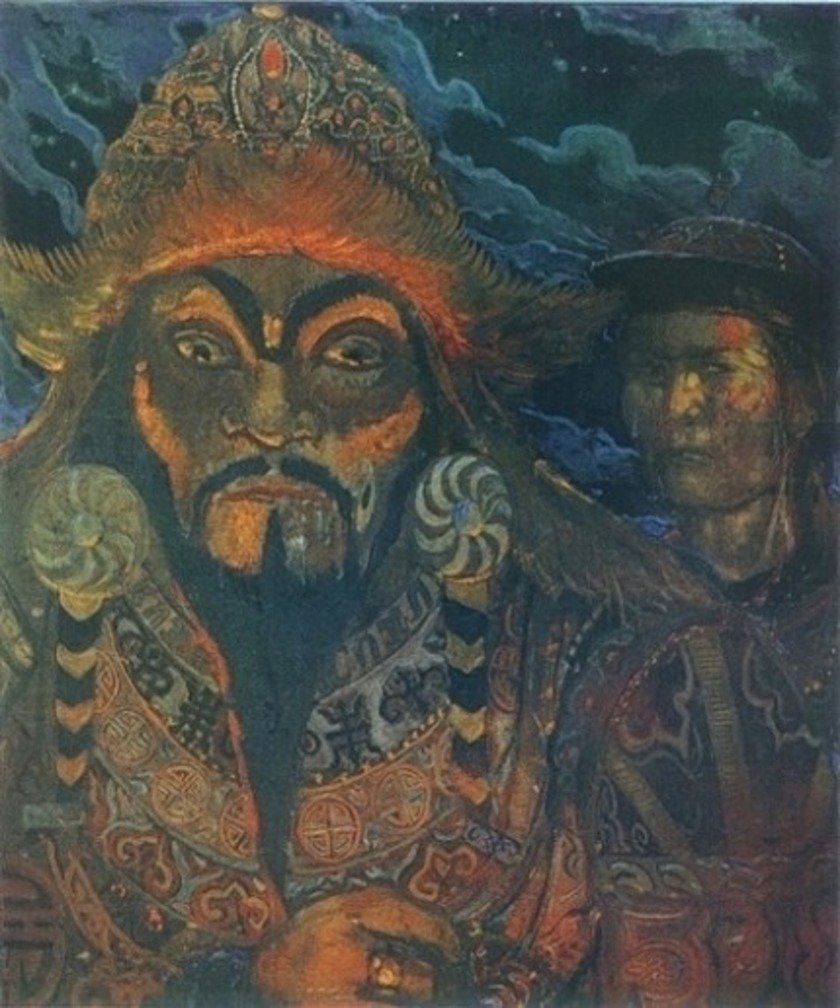
In 1357 Khan Dzhanibek (Jani Beg) died leaving his son Berdibek as his successor. Chronicles differ on the cause of Dzhanibek's death, some say he died of illness, while some say he was assassinated. The assassination of Berdibek however is not questioned. He was killed by his brother Kulpa (Qulpa) in 1359 who took his place as khan. This marks the beginning of a turbulent period for the Horde. A daughter of Berdibek was married to a Tatar commander (temnik) called Mamai, who was in charge of the Crimea and the area of the Horde to the west of the Volga. Mamai promptly rose up against Kulpa. Not being a descendent of Gengis Khan himself Mamai was barred from becoming Khan and so he installed puppet khans in his territory, which is sometimes referred to as the White Horde or the Mamaeva Horde, who acted as rivals to the khans in the capital of the Golden Horde which was by this time the city of New Sarai or Sarai-Berke. The khans in Sarai-Berke changed rapidly, practically one a year and Mamai’s power grew as the traditional centre became weaker. Eventually Mamai took Sarai-Berke and installed his puppet khan of Abdullakh Khan there in 1367 who reigned with one interruption until his death in 1370 and was replaced with his young son Bulak. Mamai continued to rule from the Crimea but had to return to Sarai-Berke to reinstall his puppet twice. Bulak was ultimately overthrown and forced out of Sarai-Berke in 1375 by Kaganbek Khan, who was succeeded by his son Arapsha in 1377.
War between Moscow and Lithuania
Moscow was able to regain some influence after the death of Ivan II in 1359. Ivan II died when his son Dmitry Ivanovich (later known as Dmitry Donskoy) was just a child and so Metropolitan Alexius served as his regent and spiritual tutor. Not content with making a child grand prince, Khan Naurus Beg (Nawruz Beg), named Prince Dmitry Konstantinovich of Suzdal-Nizhny Novgorod grand prince of Vladimir. Alexius understood the importance of a united House of Moscow and also served as tutor to Dmitry's cousin Prince Vladimir Andreevich of Serpukhov, teaching him to always respect his more senior cousin. Alexius also continued the standard Moscow policy of appeasing the Tatars, whereas Moscow's traditional rival of Tver had turned towards Lithuania against the Golden Horde. Alexius also gain special recognition in the Horde after successfully treating the eye problems of Taidula - the widow of Khan Uzbek. Making use of the turmoil in the Horde, Dmitry was able to gain the patent to rule as grand prince of Vladimir in 1362, supported by Mamai. Moscow only later dropped its claims to be returned Nizhny Novgorod when a deal was made with included Dmitry of Moscow marrying Evdokia the daughter of Dmitri Konstantinovich of Suzdal-Nizhny Novgorod.
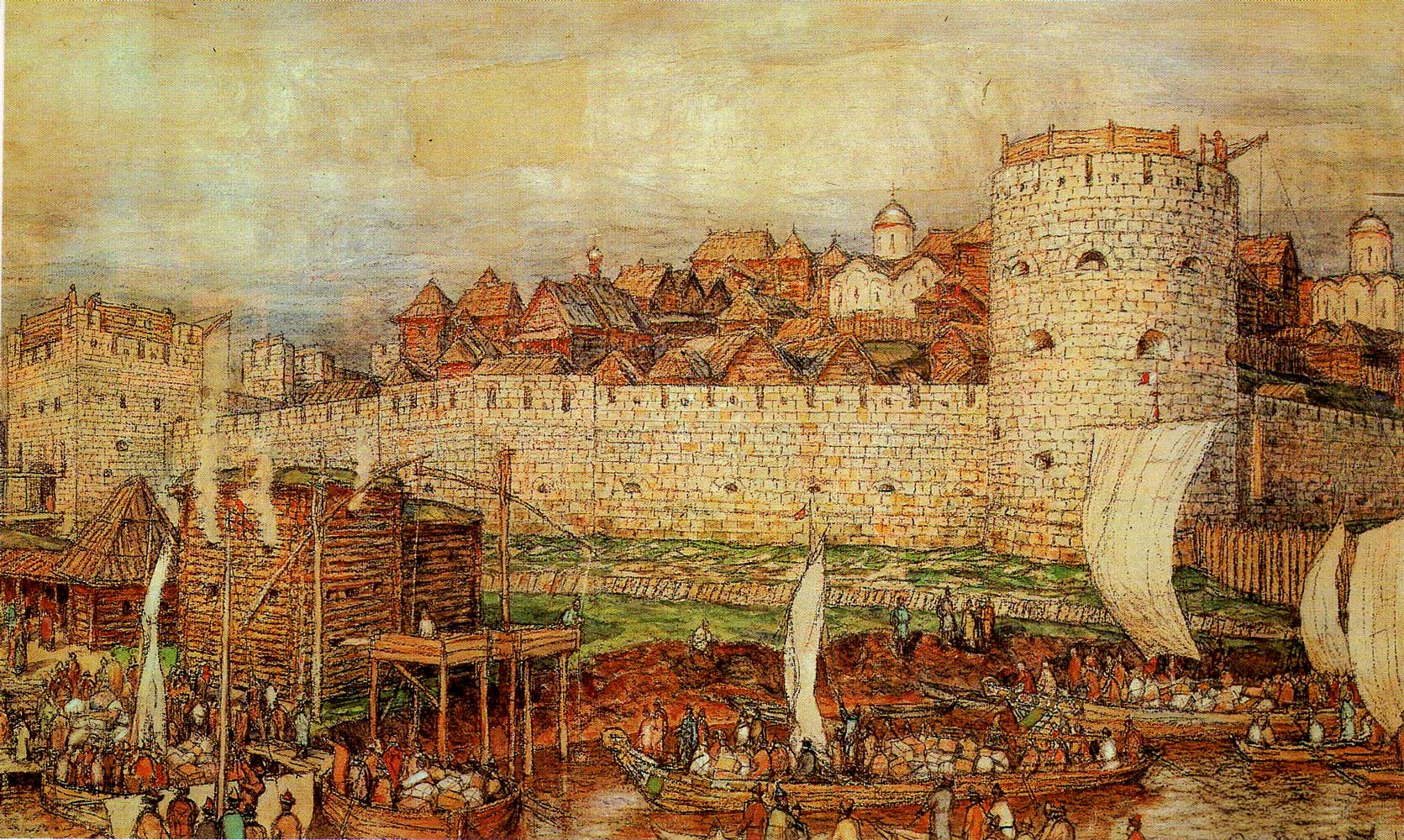
In 1368 Prince Mikhail Aleksandrovich of Mikulino (the grandson of Grand Prince Mikhail and prince of a Tver appendage) seized Tver from his uncle. Dmitry of Moscow launched a campaign against Tver. Mikhail Aleksandrovich fled to Grand Duke Algirdas of Lithuania who proceeded to besieged Moscow. The siege was quickly ended after news that Teutonic Knights were threatening Lithuania was received and Moscow. The new stone walls of the Moscow Kremlin, which were erected in 1367, passed their first test. Moscow again launched a campaign against Tver in 1370 and again Algirdas responded to this with a siege on Moscow. Dmitry's cousin Vladimir Andreevich of Serpukhov at the head of an army came to the capital's rescue and Algirdas left Moscow without a fight. Mikhail Aleksandrovich went to Mamai in 1271 and persuaded the khan to name him as grand prince of Vladimir. On his return to Rus Mikhail Aleksandrovich sacked Kostroma, Mologa, Uglich, Pereslavl-Zalessky, Dmitrov and Torzhok. However Mikhail's triumph was quickly diminished when Algirdas signed a peace treaty with Moscow after unsuccessfully besieging Volokolamsk at Mikhail's request. The treaty was sealed with the marriage of Algirdas' daughter Yelena to Vladimir Andreevich of Serpukhov. Mikhail's influence quickly waned and he himself was forced to sign a treaty with Moscow in 1375 renouncing all claims to Vladimir and Novgorod and the right to conduct foreign affairs independently. He also recognised the supremacy of Moscow.
St Sergius of Radonezh and the Troitse-Sergieva Lavra
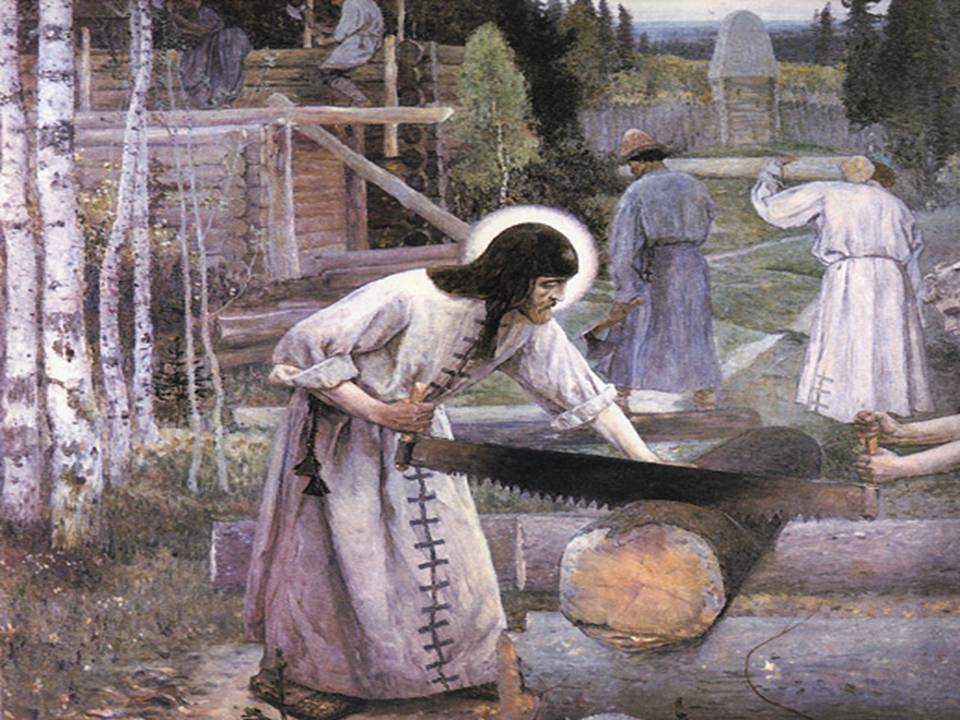
In 1337 a young monk by the name of Varfolomey left his monastery to found a new community away from civilisation in a deep forest. Varfolomey built a small wooden church and was then tonsured taking the name of Sergy (Sergius). Over the next years Sergius was joined by disciples and a charter was adopted for their community. Later these disciples left the community to found new monasteries across the country. Sergius’ reputation as a holy man also grew to such a point that he was visited by many pilgrims and Metropolitan Alexius even tried to persuade him to agree to be his successor as metropolitan. The community which Sergius founded grew into the Troitse-Sergieva Lavra in Sergiev Posad which is today one of Russia’s most important spiritual centres. Sergius was also later canonised as St Sergius of Radonezh and is now probably Russia’s most revered native saints.
The Battle of Kulikovo Field
Moscow’s may have reasserted dominance over its neighbouring principalities, but Mamai remembered how Dmitry of Moscow had blatantly disregarded his appointment of Mikhail Aleksandrovich of Tver as grand prince of Vladimir. In 1376 Mamai sent his commander Begich against Dmitry to put Moscow back in its place as a Tatar vassal. Dmitry led an army to meet the Tatars and defeated them at the Battle of the River Vozha. In response Mamai was forced to lead a punitive campaign against the rebellious Russian prince himself in 1380. Not only was Mamai worried by Dmitry’s growing independence, but he was also fighting for his position in the Golden Horde against the growing power of the new khan Tokhtamysh (Tuqtamış) who was supported by Tamerlane (Timur the Lame), the greatest Mongol-Tatar warlord of the era.
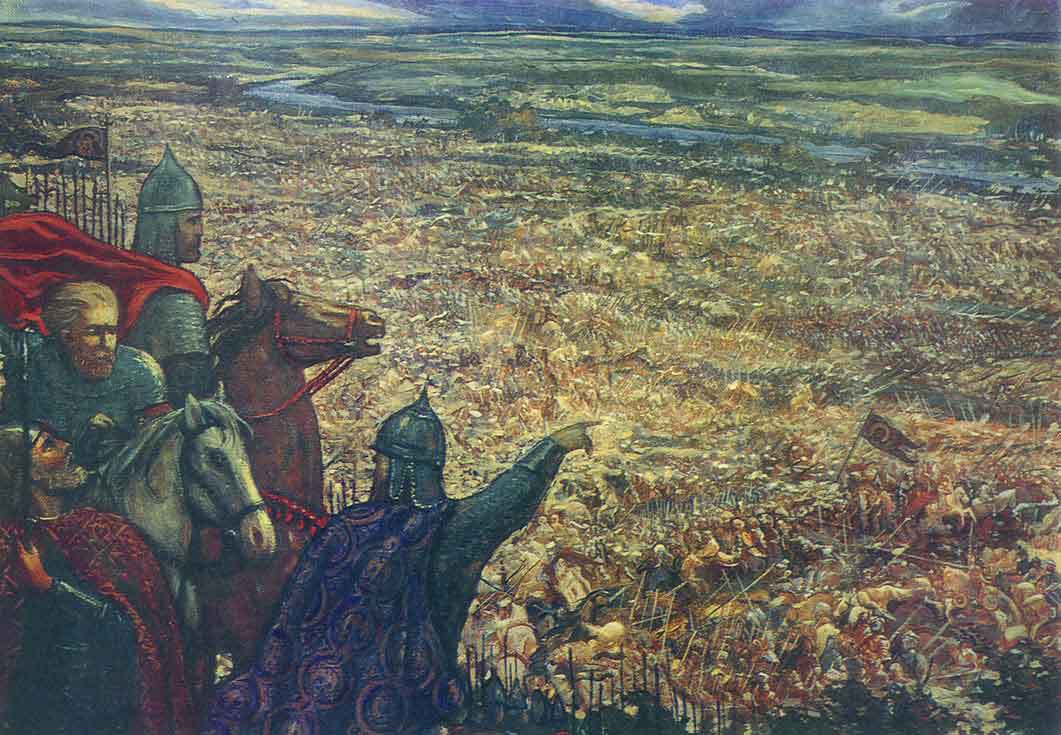
Dmitry immediately began raising an army to meet Mamai in battle and Kolomna was set as the gathering point. Before setting out, Dmitry is believed to have visited the monk Sergius to receive his blessing before the important battle. Sergius also sent two warrior monks to fight alongside Dmitry. From Kolomna, Dmitry of Moscow and Vladimir Andreevich of Serpukhov led the Rus army comprising of troops from Moscow. Bryansk, Belozersk, Murom, Polotsk, Rostov, Smolensk, Suzdal-Nizhny Novgorod, Tver, Yaroslavl and other principalities to battle and crossed the Oka at Lopasna. They finally met the Tatar army at Kulikovo Field on the River Don. Mamai had secured the support of Lithuania and the Ryazan Principality, but Dmitry managed to engage the Tatars in battle before Mamai’s allies could reach him (although perhaps they deliberately delayed their arrival). Against all odds the greatly outnumbered Rus troops achieved their second victory over the Tatars. It is said that the Rus army went to the battle as citizens of various Rus principalities but returned as Russians. Following the precedent of naming Aleksandr Nevsky for his victory on the Neva, Dmitri of Moscow became known as Dmitry Donskoy for his victory on the Don. His cousin Vladimir has also gone down in history as Vladimir the Brave.
Tokhtamysh’s Revenge
After the Battle of Kulikovo Field, Mamai fled to the Crimea where he was quickly finished off by his enemy Tokhtamysh, who reunified the Golden Horde. Just two years after the great Russian victory, Tokhtamysh succeeded where Mamai failed. Khan Tokhtamysh decided to punish Rus for the defeat at the Battle of Kulikovo Field and in 1382 launched his campaign against the Moscow Grand Principality. Rus princes were aware of the campaign and reacted in various ways: Grand Prince Dmitri Konstantinovich of Suzdal-Nizhny Novgorod sent his sons Vasili and Semyon to assist Tokhtamysh in the hope this would spare Suzdal lands; Grand Prince Oleg Ivanovich of Ryazan allowed Tokhtamysh to cross the River Oka, Grand Prince Mikhail Aleksandrovich of Tver sent an envoy to Tokhtamysh declaring his obedience and only Grand Prince Dmitri Donskoy of Moscow and Prince Vladimir the Brave of Serpukhov left their cites for Kostroma and Volokolamsk respectively to raise troops.
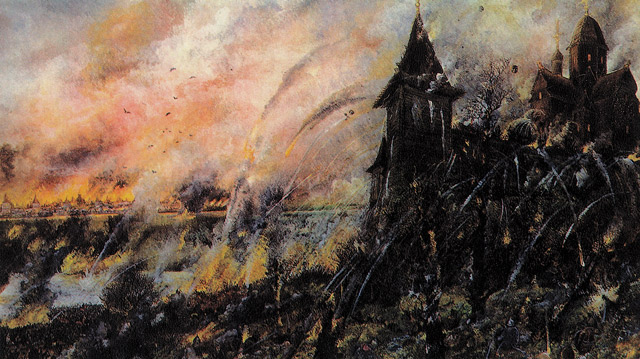
The first city to be sacked by Tokhtamysh was Serpukhov and then in August 1382 Tokhtamysh reached panic-ridden Moscow. After two days of besieging the city, Tokhtamysh was only able to take the city by sending the Suzdal princes to explain how the citizens would be spared if they opened their gates to Tokhtamysh. The Muscovites believed the promise, and were subsequently massacred by Tokhtamysh's troops who burned the city down. After this Tokhtamysh went on to sack Pereslavl-Zalessky, Vladimir, Yuriev-Polsky, Zvenigorod, Mozhaisk, Yuriev Polsky and Kolomna and was only eventually stopped by Prince Vladimir the Brave's army outside Volokolamsk. With this defeat Tokhtamysh retreated back to the Horde, plundering Ryazan lands on the way and taking many Russians with him to be sold into slavery. Donskoy had no choice but to recognise the supremacy of the Golden Horde over Moscow and pay tribute to the khan. However Tokhtamysh kept Donskoy as grand prince, although he also made the Tver Grand Principality independent of Moscow.
Death of Dmitry Donskoy
Despite the setback of Toktamysh's revenge, When Donskoy died in 1389 he was able to leave his principality, including Vladimir, to his son Vasily Dmitrievich (Vasily I). From this moment onwards the grand prince of Vladimir was always a prince of Moscow and historians refer to the Moscow Principality as Muscovy. Donskoy also created appendages for his other sons: Yuri Dmitrievich received Zvenigorod and Galich, Andrey Dmitrievich - Mozhaisk, Pyotr Dmitrievich - Dmitrov and Konstantin Dmitrievich - Uglich. Donskoy’s dream of complete independence from the Tatars was not realised in his lifetime, but his victory at Kulikovo Field had firmly placed in the minds of Russians the thought that the days of the Mongol-Tatar Yoke could one day come to an end. Early in his reign in 1392 Vasily I was able to increase the influence and territory of Moscow by annexing the Nizhny Novgorod-Suzdal Grand Principality after purchasing the patent to rule it from the khan. This was followed by the annexation of Vologda in 1397 and of Murom in 1398.
War between Tokhtamysh and Tamerlane
In 1385 Tokhtamysh turned against his former supporter Tamerlane desiring to win back all the former territories of the Golden Horde which had been incorporated into the realm of Tamerlane. Rather unsurprisingly Tokhtamysh was quickly defeated by the great Mongol-Tatar warlord. Tokhtamysh was determined though and regained his strength and rode against Tamerlane once more. This time Tamerlane knew he had to deal with his enemy once and for all. In 1395 Tamerlane attacked the Golden Horde and sacked the cities of Azov, Astrakhan and Sarai-Berke. He continued deep into Rus territory and sacked Yelets and Moscow feared it would be next. Rus troops were gathered but there was no confidence in the city that it could hold out against the mighty Tamerlane. According to legend, the Our Lady of Vladimir Icon was brought from Vladimir to Moscow In an attempt to ensure divine protection for the city. It appeared to work as Tamerlane then changed course and headed back south. However a more rational explanation would be that Tamerlane was only interested in inflicting damage on Tokthtamysh’s realms and not in conquering them for himself and therefore never had any appetite for risking his troops against well-fortified Moscow. Tokhtamysh fled to Grand Duke Vytautas in Lithuania, but even with Lithuanian support Totkhtamysh was defeated at the Battle of Vorskla River in 1399 by Tamerlane’s forces which were led by the military commander Edigu. Tokhtamysh was eventually killed by Edigu in battle in 1406.
As a result Edigu became the most influential ruler in the Horde although like Mamai he was forced to rule through puppet khans as he was not of the blood line of Gengis Khan. The war was over but at an enormous cost to the Golden Horde, which was significantly weakened by the struggle between the two leaders. After the chaos of the years of Mamai, the Tamerlane-Tokhtamysh wars left the Horde on its last legs, ripe for a final blow.


